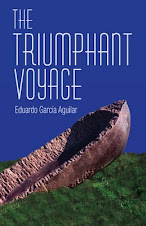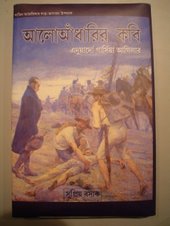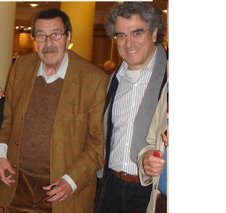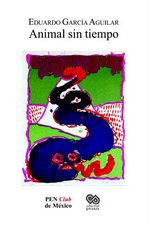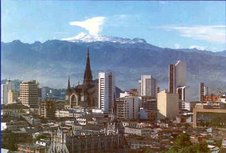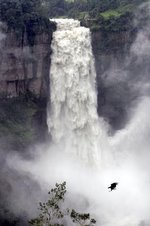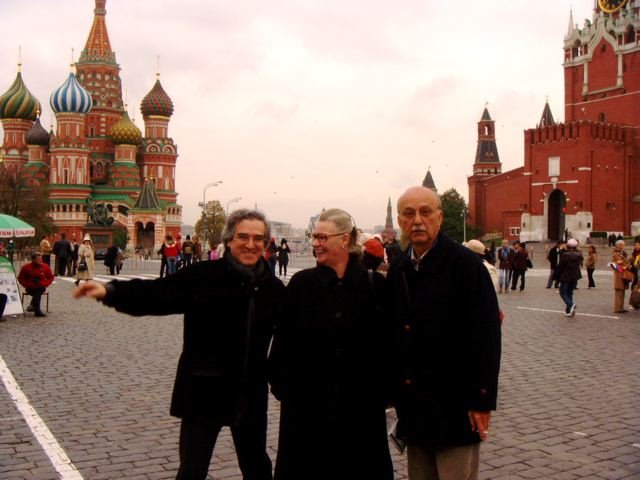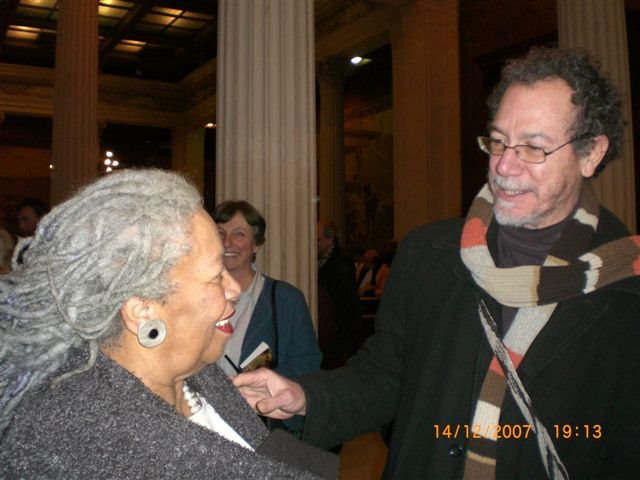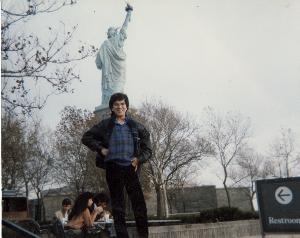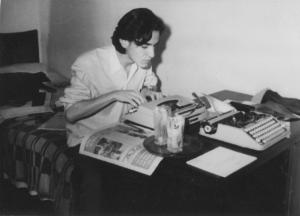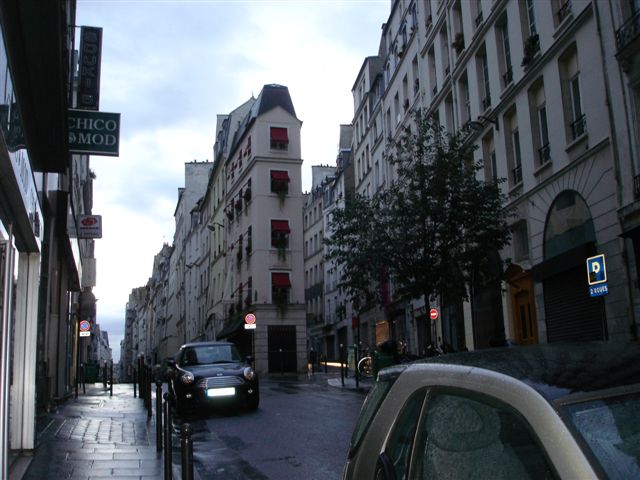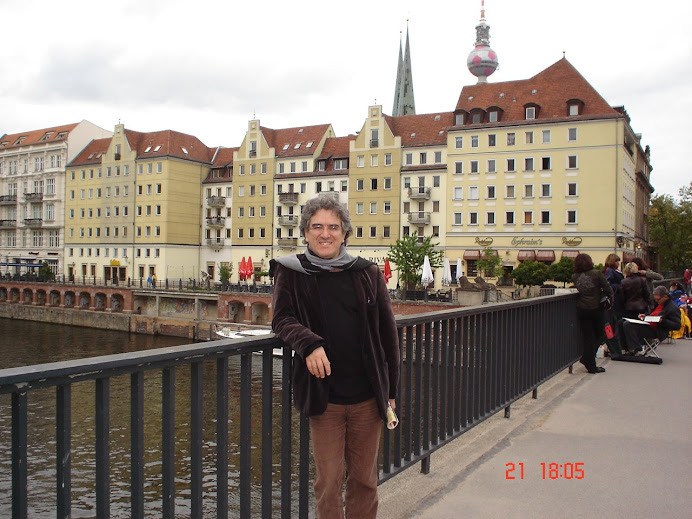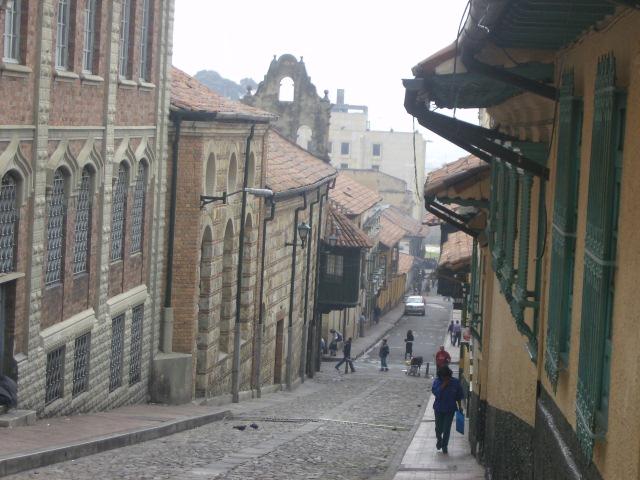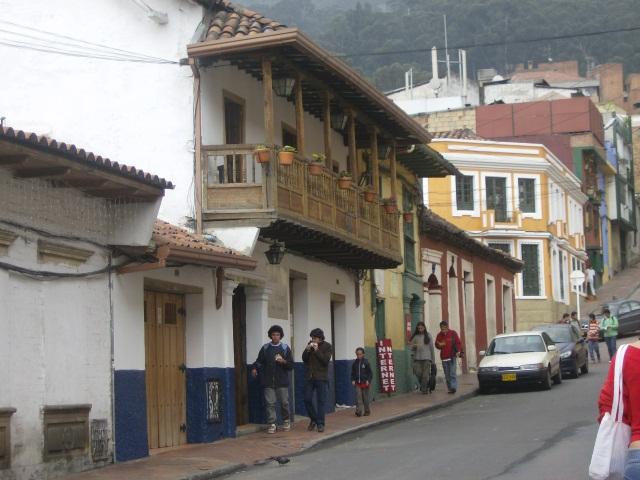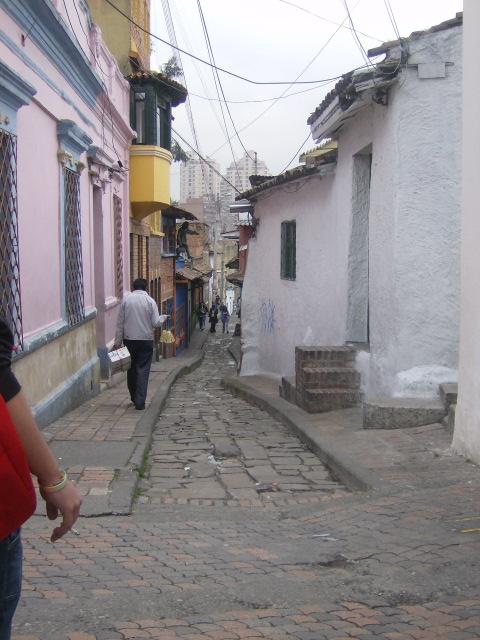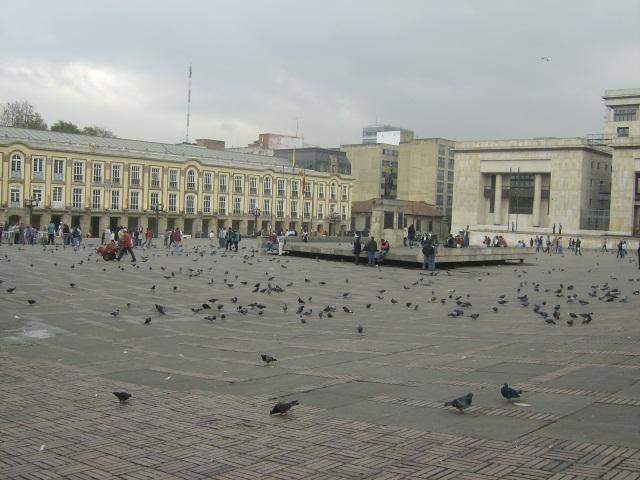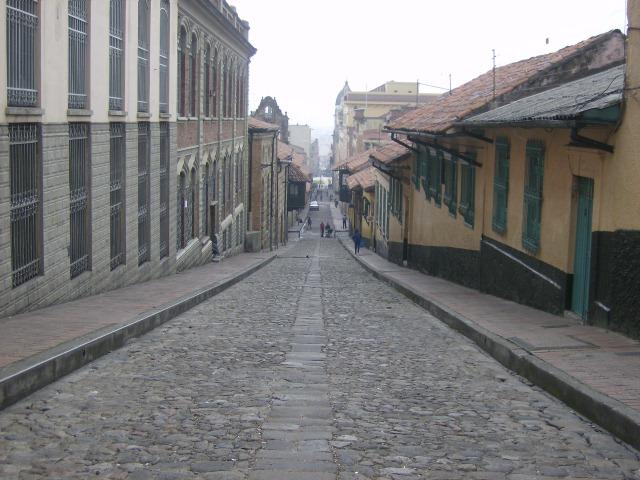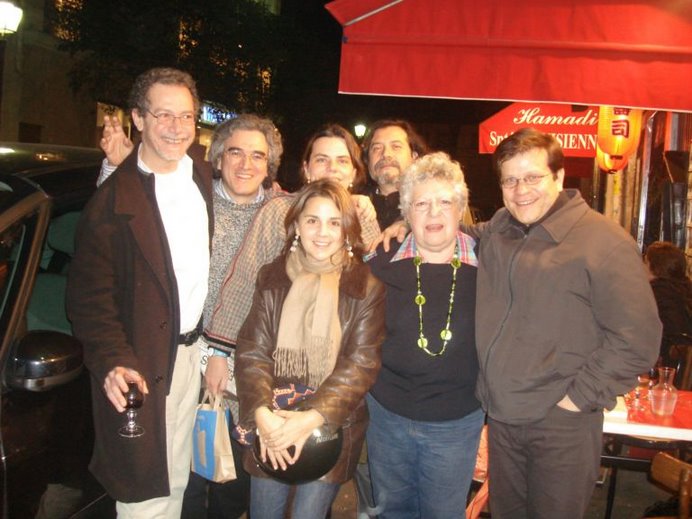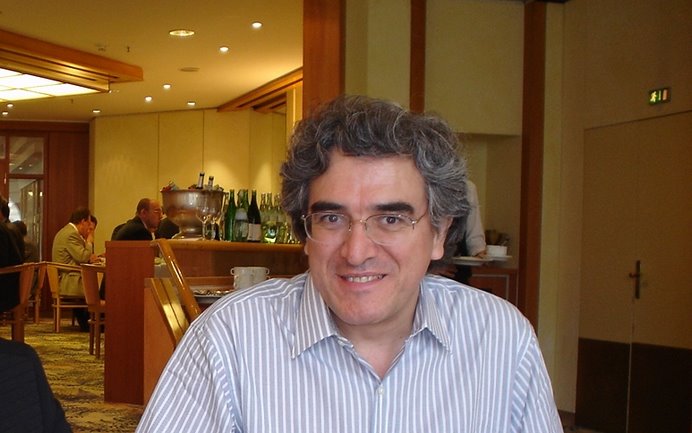E d u a r d o G a r c í a A g u i l a r
~ P a r i s, Fr a n c e
Published in MARGIN (www.angelfire.com/wa2/margin/Aguilar.html)
A FEW vultures fly over the river of black lava that flows down the mountain like demonic vomit. They slowly descend and come to rest upon lunar rocks and with their inquisitorial beaks cautiously observe my movements. Shortly after getting out of the taxi I understand these strange animals to be the most advantaged, the most gainful in this mournful and allegorical epoch. Old vehicles pass on the highway raising a punctual, poisonous dust that settles over the human remains, recently devoured by black birds. The man leads me over the rocks toward the hollows most populated by the skulls and rib cages of civilians and soldiers.
Above us I see the long black river of volcanic lava, and a Luciferian feeling stirs me to poke beneath the brambles and thickets and prod even further among rusty belt buckles and pelvic bones covered by cobwebs. The photographer kicks a skull with the point of his shoe and places it among the others to get a good picture, while I stop to observe the bones of so many men. Among the remains are bones of dogs and skeletons of children. The smell of death floats in the wind. Ten meters away men with lost, ghost-like gazes unload refuse from a truck and observe us with curiosity, as if we were another, even more rapacious kind of vulture.
The afternoon lingers in a leaden stupor and a silvery air spreads over the sterile landscape of the Killing Fields. Leaping over the stones spewed many decades ago by a nearby volcano, I destroy the extensive cobwebs and continue watching the spectacle. At times I'm struck by the temptation to clutch one of the skulls and ask the photographer to take a portrait of me with this terrible black profundity in my hand, but then I think how obscene that would be. I establish a dialogue with the furtive gazes of the vultures, while the Basque photographer continues arranging the skeletons and the taxi driver talks to me about death. He lives a few kilometers away and makes his living taking Western scavengers to see and enjoy the Killing Fields.
At times I feel like many eyes are watching me, and I discern their brilliance coming from beneath the rocks and in the air, for they fly languidly, expectantly. A thousand eyes in the skies looking at me without hate, without smiles, only looking. I feel like I've been placed in a black hollow, in one of those centers where the mass, the volume of truth is even more present than in the streets. I, too, am a piece of death. I've come here to provoke death. So it will speak to me. So it will quit me of my fear. A plane flies through the cloudless blue sky and several vehicles, full of living men who seem as if they were already dead, pass down the highway. The taxi driver speeds up and talks to me about the town and markets we pass through.
I feel like I'm inside an illuminated steel tube and I hear explosions in the air, invisible blasts of wind, the violent sucking of a gigantic and lascivious mouth. As we approach the City of Death that concussion of wind sways us even more, crowding out the silence. We reach the hotel on the Boulevard of Heroes and the taxi finds a place in front of the door. I walk across the carpet, ask for my key and then head to the restaurant. An American journalist, skinny, spare, dressed casually, crosses the room with a bottle of whiskey in his hand, lips dried and chapped. Another reporter struts about in his clogs, jeans, t-shirt and bullet-proof vest. Off to the side an obsessed and obese newsman wears a shirt an American is selling that says, "Don't shoot. I'm a journalist."
I feel like puking on the lecherous platter they serve me and the white wine tastes like a lichen extract. The sepulchral music echoing around a few businessmen stuns me. Gigantic gringo marines approach the bar and outside a man butts his head against the wall. He looks like the soldier with a scar along one side of his face who gave me my safe conduct pass so I could freely move throughout this city of fateful ambushes. With that piece of paper I've gone through markets and alleys of lost neighborhoods and seen the faces of women crying before the tomb of an assassinated archbishop. I've seen the fear in the gaze of those who leave letters at the post office or the fear of people on the street when huge trucks filled with soldiers rumble by, their smiles menacing anyone who dares look them in the eyes.
As the days pass I begin to feel a tickling in my armpits and return to the bottle like a shipwreck survivor does to a lifejacket. The fear of dying struck by a stray bullet or in the middle of a skirmish provoked by the army on a street corner while I drink a cup of coffee or buy a newspaper keeps me from sleeping, disturbs my mind at the moment I begin to write the articles I must send by cables and mysterious airwaves to the other side of the world, to the City of Peace. As soon as I write a few lines a bitter taste lodges in my throat that prevents me from goin on. From the other side of the telex a desperate voice asks me for macabre, bloody news. But I only manage to see the scarred face of the major with a revolver in his hand holding out to me the long safe conduct pass, some lost hippies, a few hostages, the highway and a certain nostalgia for an innocent world. I enter the bar with the Basque photographer and get drunk while rock music plays, forgetting that I am an abundantly wise vulture. As the liquor induces its effects, the light becomes more tenuous and only a red haze is cast over the walls. A dance of devils surges from the depths of the stage. The waiters smile and excuse themselves, coming and going amidst the clamor. In a flash the red light changes to neon and at the tables I see only vultures, buzzards who drink from the cups of the clients. On stage, instead of a band playing pop music there are birds as big as human beings, with large beaks and dark eyes who brilliance reflects off the bottles. Their grotesque dance leaves behind a wake of feathers.
I flee toward the carpeted vestibules of the luxurious hotel and I see only uniformed vultures helping put baggage in the elevators and enormous vultures tipping a few female birds that cackle in the lobby, singing along to the solemn nocturnal melodies. I ask for the key to my room and I go up agitated, trying to fend off the images assaulting me.
A slight earthquake shakes the corridors of the sixth floor. Several shots come from outside, far away, and murmurs from a room fly through the clean passages where a few plastic plants wither as I walk by. I search for the keys to my room and try to open it after a long interval that clumsy shaking hands make more difficult. At last I manage to open the door and enter. I take a breath and as I head with closed eyes toward the comfortable recess I need not open them to understand someone is watching me. Opening my eyelids I see an enormous nest with three chicks being fed by a vulture just my size. I raise my hands and scream and fall silent to discover my wings of black plumage flapping, casting new shadows upon the walls, my screams coming not from my mouth but from a rapacious, malodorous beak. In silence I fling myself down in the nest and there I sleep with no other hope but death.
Above us I see the long black river of volcanic lava, and a Luciferian feeling stirs me to poke beneath the brambles and thickets and prod even further among rusty belt buckles and pelvic bones covered by cobwebs. The photographer kicks a skull with the point of his shoe and places it among the others to get a good picture, while I stop to observe the bones of so many men. Among the remains are bones of dogs and skeletons of children. The smell of death floats in the wind. Ten meters away men with lost, ghost-like gazes unload refuse from a truck and observe us with curiosity, as if we were another, even more rapacious kind of vulture.
The afternoon lingers in a leaden stupor and a silvery air spreads over the sterile landscape of the Killing Fields. Leaping over the stones spewed many decades ago by a nearby volcano, I destroy the extensive cobwebs and continue watching the spectacle. At times I'm struck by the temptation to clutch one of the skulls and ask the photographer to take a portrait of me with this terrible black profundity in my hand, but then I think how obscene that would be. I establish a dialogue with the furtive gazes of the vultures, while the Basque photographer continues arranging the skeletons and the taxi driver talks to me about death. He lives a few kilometers away and makes his living taking Western scavengers to see and enjoy the Killing Fields.
At times I feel like many eyes are watching me, and I discern their brilliance coming from beneath the rocks and in the air, for they fly languidly, expectantly. A thousand eyes in the skies looking at me without hate, without smiles, only looking. I feel like I've been placed in a black hollow, in one of those centers where the mass, the volume of truth is even more present than in the streets. I, too, am a piece of death. I've come here to provoke death. So it will speak to me. So it will quit me of my fear. A plane flies through the cloudless blue sky and several vehicles, full of living men who seem as if they were already dead, pass down the highway. The taxi driver speeds up and talks to me about the town and markets we pass through.
I feel like I'm inside an illuminated steel tube and I hear explosions in the air, invisible blasts of wind, the violent sucking of a gigantic and lascivious mouth. As we approach the City of Death that concussion of wind sways us even more, crowding out the silence. We reach the hotel on the Boulevard of Heroes and the taxi finds a place in front of the door. I walk across the carpet, ask for my key and then head to the restaurant. An American journalist, skinny, spare, dressed casually, crosses the room with a bottle of whiskey in his hand, lips dried and chapped. Another reporter struts about in his clogs, jeans, t-shirt and bullet-proof vest. Off to the side an obsessed and obese newsman wears a shirt an American is selling that says, "Don't shoot. I'm a journalist."
I feel like puking on the lecherous platter they serve me and the white wine tastes like a lichen extract. The sepulchral music echoing around a few businessmen stuns me. Gigantic gringo marines approach the bar and outside a man butts his head against the wall. He looks like the soldier with a scar along one side of his face who gave me my safe conduct pass so I could freely move throughout this city of fateful ambushes. With that piece of paper I've gone through markets and alleys of lost neighborhoods and seen the faces of women crying before the tomb of an assassinated archbishop. I've seen the fear in the gaze of those who leave letters at the post office or the fear of people on the street when huge trucks filled with soldiers rumble by, their smiles menacing anyone who dares look them in the eyes.
As the days pass I begin to feel a tickling in my armpits and return to the bottle like a shipwreck survivor does to a lifejacket. The fear of dying struck by a stray bullet or in the middle of a skirmish provoked by the army on a street corner while I drink a cup of coffee or buy a newspaper keeps me from sleeping, disturbs my mind at the moment I begin to write the articles I must send by cables and mysterious airwaves to the other side of the world, to the City of Peace. As soon as I write a few lines a bitter taste lodges in my throat that prevents me from goin on. From the other side of the telex a desperate voice asks me for macabre, bloody news. But I only manage to see the scarred face of the major with a revolver in his hand holding out to me the long safe conduct pass, some lost hippies, a few hostages, the highway and a certain nostalgia for an innocent world. I enter the bar with the Basque photographer and get drunk while rock music plays, forgetting that I am an abundantly wise vulture. As the liquor induces its effects, the light becomes more tenuous and only a red haze is cast over the walls. A dance of devils surges from the depths of the stage. The waiters smile and excuse themselves, coming and going amidst the clamor. In a flash the red light changes to neon and at the tables I see only vultures, buzzards who drink from the cups of the clients. On stage, instead of a band playing pop music there are birds as big as human beings, with large beaks and dark eyes who brilliance reflects off the bottles. Their grotesque dance leaves behind a wake of feathers.
I flee toward the carpeted vestibules of the luxurious hotel and I see only uniformed vultures helping put baggage in the elevators and enormous vultures tipping a few female birds that cackle in the lobby, singing along to the solemn nocturnal melodies. I ask for the key to my room and I go up agitated, trying to fend off the images assaulting me.
A slight earthquake shakes the corridors of the sixth floor. Several shots come from outside, far away, and murmurs from a room fly through the clean passages where a few plastic plants wither as I walk by. I search for the keys to my room and try to open it after a long interval that clumsy shaking hands make more difficult. At last I manage to open the door and enter. I take a breath and as I head with closed eyes toward the comfortable recess I need not open them to understand someone is watching me. Opening my eyelids I see an enormous nest with three chicks being fed by a vulture just my size. I raise my hands and scream and fall silent to discover my wings of black plumage flapping, casting new shadows upon the walls, my screams coming not from my mouth but from a rapacious, malodorous beak. In silence I fling myself down in the nest and there I sleep with no other hope but death.
Translated by Jay Miskowiec

